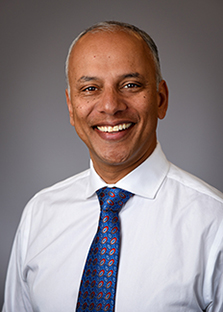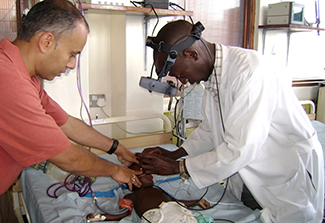Finding the connection between malaria and brain development: Q&A Chandy John, MD, MS
January/February 2024 | Volume 23 Number 1
 Photo courtesy of Chandy JohnDr. Chandy John
Photo courtesy of Chandy JohnDr. Chandy John
Dr. Chandy C. John is the director of the Ryan White Center for Pediatric Infectious Disease and Global Health at Indiana University School of Medicine. A practicing clinician, he also conducts research and training programs in Kenya and Uganda, focusing on malaria pathogenesis, immunology, and epidemiology. John served as the president of the American Society of Tropical Medicine and Hygiene in 2019. He currently serves on the Thrasher Research Scientific Advisory Board and the Fogarty Advisory Board and is a member of the American Academy of Pediatrics' Committee on Infectious Diseases. His authorship includes more than 250 peer-reviewed scientific publications and 30 book chapters in addition to published poems, essays, and short stories.
Tell us about your study of malaria and neurobehavioral development.
We don't have final results yet, but I can tell you that the preliminary data are quite clear in showing that severe malaria affects cognition long-term. Children with severe malaria have lower cognitive scores for a long time afterwards, and this seems to be largely limited to cerebral malaria and severe malarial anemia. The other forms of severe malaria don't seem to have the same strength of effect as those two, which is what we found in a previous study as well.
We have also looked at whether severe malaria in a child might affect the economic productivity of their household. If the child has impairment or repeated episodes of malaria that may play into the family not doing well because of disruptions in work. Early results show that severe malaria does affect economic productivity of a household long-term. So that’s another important outcome. We've done a lot of analysis, so these preliminary results are unlikely to change.
What's the relationship between the ApoE4 gene and malaria?
Our study of ApoE4 was inspired by the work of another Fogarty grant recipient, Dr. Dick Guerrant, who's at the University of Virginia. ApoE4 is associated with Alzheimer's disease and with worse outcomes in individuals who have traumatic brain injury, but it hadn't really been studied in kids with common infectious diseases that may also affect the brain. So, Guerrant and his collaborator, Dr. Reinaldo Oria, did this study in Brazil on how ApoE4 relates to cognition in children with diarrheal disease.
It was known that kids with a lot of diarrheal disease have worse cognitive outcomes, so when they looked at it, they found that ApoE4 was associated with better cognitive outcomes. So that was a striking and surprising finding. ApoE4 is a common genetic variant in people, so why has it been conserved [persisted over time due to natural selection] when it does such terrible things to the brain? They speculated that maybe it does positive things early on, and, in the past (before the 1900s), people typically didn't live long enough to get Alzheimer's, so perhaps an improvement in cognition might be a reason for conservation of the ApoE4 allele population.
Like diarrhea, malaria is a common childhood disease, so we looked at that and discovered two somewhat contradictory findings. The first was that ApoE4 is associated with an increased risk of severe malaria and an increased risk of death if you have severe malaria. Comparing siblings and children in the community, the kids who had severe malaria were more likely to have the ApoE4 allele. And when we looked at kids who had severe malaria, those who had ApoE4 were more likely to die.
Conversely, among the children who survived severe malaria, the same allele was associated with better cognition in kids under age 5. Two conflicting effects… so it's a puzzling story. Other studies with large populations of kids with severe malaria are needed to validate this association and, if they do, then what’s the mechanism? Can we use that information to stop more severe malaria or mortality due to severe malaria?
 Photo courtesy of Chandy JohnDr. John assists a trainee in caring for a pediatric patient.
Photo courtesy of Chandy JohnDr. John assists a trainee in caring for a pediatric patient.
Where does your “Gut microbiota and human malaria” project stand?
My co-principal investigator is one of my fellow faculty members here at Indiana University, Dr. Nathan Schmidt, and he's investigated the relationship of the gut microbiome to severe malaria. He's shown that the gut microbiome is different in children with severe malaria from that in children without severe malaria, suggesting that there may be things in the microbiome that could predispose you to getting severe malaria.
In our recent paper, Dr. Rabindra Mandal showed that children who had severe malarial anemia were more likely to have more abundant
Bacteroides species than kids who didn't have severe malarial anemia. This suggests that combatting
Bacteroides could decrease the risk of severe malarial anemia. When the team introduced
Bacteroides into a mouse model, led to severe malaria in those mice infected with the
Plasmodium species. The study supports the idea that more abundant
Bacteroides is causative and not just an associated phenomenon.
We're also looking at ways in which the gut microbiome might alter immune response. We have banked immune cells from these children, for example white blood cells that mediate various immune functions. We are looking at whether we can see a pathway or a white blood cell type pattern in kids who have a specific microbiome. A deficiency might make them more prone to severe malaria. The next steps are to see if we can validate those findings and then think about how altering the gut microbiome could reduce the risk of severe malaria.
Has serving on Fogarty’s board helped advance your knowledge?
Absolutely. I really enjoy being on the board because members are deliberately chosen to include not only researchers, but also people who work in public health and in other related areas of global health. People who are experts in education, people who work at societies and professional organizations. It's a very broad range of expertise, deliberately chosen so that Fogarty gets the best input from people with different expertise in global health. I've learned a lot from the other researchers on the board, but also from people across all fields about how they evaluate questions of global health significance. Also, at the open board meetings, we have experts from all over, including the heads of various NIH institutes, come in and talk to us about their global health priorities. They get input from us on what we think might be important for global health in their particular area. And that's really great too.
What role does collaboration play in your work?
Great work gets done because of great collaborators and a great team, and I have the best. My key collaborators at Indiana University are Drs. Andrea Conroy, Dibya Datta, Nathan Schmidt, Prasida Holla and Giselle Lima-Cooper. My primary collaborators at Makerere University are Drs. Ruth Namazzi, Robert Opoka, Paul Bangirana, Anthony Batte and Richard Idro, who’ve led the way for many of our studies and taught me a lot. Four of my key collaborators in Uganda (Namazzi, Opoka, Bangirana and Batte) have received Fogarty fellowships, while Idro is a joint principal investigator with me on our Fogarty training grant for Ugandan students and post-doctoral fellows.
Though we focused on my work in Uganda in this interview, I’ve also worked in Kenya with the Kenya Medical Research Institute, Moi University, and Jaramogi Oginga Odinga University (JOOU) studying the effect of malaria transmission on immunity. My chief collaborator at JOOU has been Dr. George Ayodo. Fogarty-supported training has also been critical for that work, including support of a former student and current collaborator, Dr. Bartholomew Ondigo of Egerton University. So, this incredibly strong Fogarty connection has been key to advancing research capacity and strength in our programs.
What’s ahead for you?
I’m excited about a new project called “SMART Brain,” which is short for Severe Malaria And Risk to the Brain. What happens to the brain in severe malaria is a complex process and we have clues to what may be leading to brain injury, but we don't yet have rock solid answers as to the mechanisms that would then lead to good interventions.
In our previous studies of kids with cerebral malaria, we did a lumbar puncture as part of standard clinical practice, to test the cerebrospinal fluid for evidence of meningitis. We saved some of that fluid to test for other factors that might affect cognition. This allowed us to analyze the fluid that bathes the brain, but we weren’t really able to look at the brain itself.
With SMART Brain, Indiana University has gotten funds to obtain a mobile MRI to use at the hospital in Uganda where we do our severe malaria studies. With MRIs we can look at the brain in children with severe malarial anemia who have long-term cognitive impairment, but whose brain function is largely unstudied. In addition to using MRI to evaluate anatomic abnormalities, we will employ EEG to map neurotransmission pathways and transcranial Doppler testing to measure blood flow. Adding these modalities to our established tests for systemic factors should enable us to really delve into what leads to brain injury in severe malaria and how it relates to what’s happens in the rest of the body. From there we hope to develop interventions to combat brain injury in severe malaria.
More Information
Updated February 14, 2024
To view Adobe PDF files,
download current, free accessible plug-ins from Adobe's website.
Related World Regions / Countries
Related Global Health Research Topics